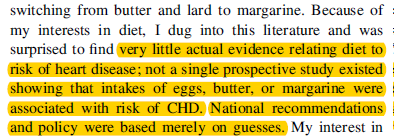
Sure. I'll bite.
…f-47f8-835f-90887a893dea.filesusr.com/ugd/7927a7_6ff…
…f-47f8-835f-90887a893dea.filesusr.com/ugd/7927a7_6ff…
https://twitter.com/Tom_Babington1/status/1335313489620033546
Twitter summary - The DGA:
1) Are ineffective. They were developed to prevent an "epidemic" of obesity & chronic disease & they did not.
2) Lack evidence. Don't take my word for it; Walter Willett says so too:
1) Are ineffective. They were developed to prevent an "epidemic" of obesity & chronic disease & they did not.
2) Lack evidence. Don't take my word for it; Walter Willett says so too:

4) Increased mistrust in science - and particularly public health applied science - among certain groups.
5) Redirected public health resources away from structural problems & towards interventions for changing individual behavior, an approach with multiple ethical issues.
5) Redirected public health resources away from structural problems & towards interventions for changing individual behavior, an approach with multiple ethical issues.
For example,
6) Support rhetorics of blame & shame that prevent widespread outrage at the ideas voiced here by @UNC professor Barry Popkin. bigthink.com/dangerous-idea…
6) Support rhetorics of blame & shame that prevent widespread outrage at the ideas voiced here by @UNC professor Barry Popkin. bigthink.com/dangerous-idea…

7) Promote ethnocentric views of "healthy diets," a form of dietary colonization where foods traditionally considered nourishing within a culture are disparaged & must be limited or altered in order to meet standards of "healthy food."
8) Inadvertently resulted in public health prescriptions being applied in clinical settings, with a "default" diet treated as the "norm" from which all other dietary patterns are deviant.
9) Ratified the acceptance of low-quality or inappropriate data to make public health recommendations.
10) Warped lines of questioning in nutrition science to follow agendas that would support the DGA - developers of 1980 DGA actually intended the DGA to do this.
10) Warped lines of questioning in nutrition science to follow agendas that would support the DGA - developers of 1980 DGA actually intended the DGA to do this.
Enough? I got more if needed 😆
• • •
Missing some Tweet in this thread? You can try to
force a refresh




